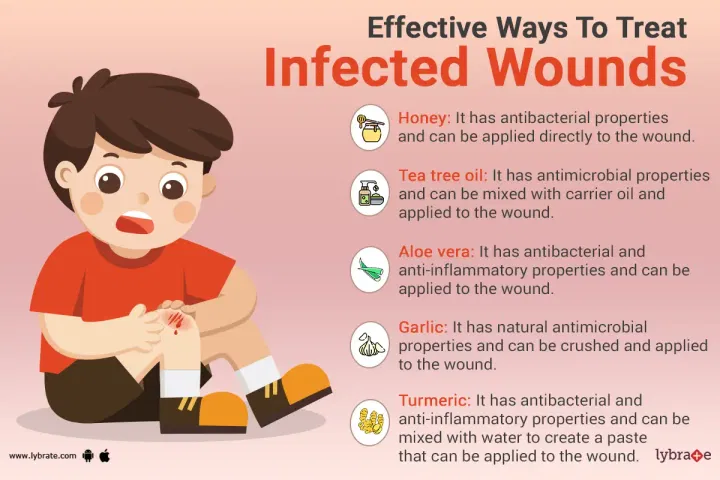Ways to Treat an Infected Wound Naturally
Minor cuts and wounds are inevitable and bound to come about every now and then. However, it is important to clean them immediately with lukewarm water and soap to prevent infection. If a wound still gets infected by any means, however, soap and water will no longer suffice; it may be time to seek medical attention or try some effective natural remedies.
Some signs that warrant medical treatment include a large amount of pus in the wound, the fact that the wound does not stop bleeding, or the case in which it gets worse in any other way. Moreover, you will be happy to know that there are many natural remedies that claim to be able to treat infected wounds, but are they actually effective?
In this article, we will explore some of the most popular natural remedies for mild wounds and find out what the science says about their safety and effectiveness. So, let us begin with it!
Are Natural Treatments Effective for Infected Wounds?
It is a common belief that most people typically rely on conventional treatments when it comes to wound care. However, you will be surprised to come across the fact that even natural remedies are getting more and more popular these days. These remedies are even getting a second look from modern researchers.
This is because there are a number of natural substances or ingredients that have antioxidant, antimicrobial, and anti-inflammatory properties, some of which have been used as effective natural medicine for centuries. However, it is important for you to know that natural remedies should only be used to treat minor wounds.
In fact, a wounded person should never rely on alternative or natural remedies in lieu of medical attention or professional help for severe wounds or infections. Additionally, the following are some natural substances that can be great for treating an infected wound, but you must keep in mind that they should never be used on open wounds:
Lavender Essential Oil
The holy grail for any infection is clearing the infection in the shortest possible time. While there are a lot of antibiotics that can help you fight infections, you might want to try using essential oils. In fact, lavender essential oil, specifically, is something you might want to try for great results.
According to a study recently conducted in the United States of America (US), this essential oil may help fight infections and speed up the wound healing process. It must be known that lavender oil is a multipurpose oil that has a number of health benefits, one of which is its ability to speed up wound healing.
This oil also has antimicrobial and antibacterial properties, which makes it a perfect natural salve for healing minor scrapes, cuts, and wounds. It is, however, important to keep in mind that you must dilute the lavender essential oil with a carrier oil, such as olive, jojoba, or almond oil, prior to using it on an infected wound.
Turmeric Paste
Turmeric is one of the most common ingredients, especially in India, and can be found in every Indian kitchen. Apart from being a flavoring and coloring substance for centuries, turmeric also has some great medicinal properties. It essentially contains curcumin, which can naturally work as an antimicrobial and anti-inflammatory component.
This means that it may help heal minor skin wounds when applied to them in paste form. In fact, a recent study claims that turmeric may even possess some anti-infectious components.
Furthermore, it must be noted that turmeric is basically a plant with bright yellow leaves that is mostly grown in the Indian subcontinent. It is primarily used in a number of Asian countries.
Turmeric has myriad health benefits and excellent medicinal properties, including its anti-inflammatory and anti-microbial characteristics. It also helps lower cholesterol, reduce skin acne, and has numerous other health benefits that can make your life easier.
Raw Honey
Honey doesn't have to be just a sweet ingredient in your tea. It can even be helpful in healing minor wounds and preventing or combating infections. In fact, it can be a great alternative to modern medicine because it doesn't have any side effects.
Honey has long been known as a natural remedy for healing, and now even clinical researchers believe in and approve of it. The nectar of flowers is not only a source of nutrients for bees. It is also a wonder medicine. It has been used since the earliest of times to heal cuts and wounds.
And, in ancient Egypt, even in the time of the pharaohs, it was used to embalm the dead. Today, medical science is also looking at some of the health benefits that they can glean from honey.
All things considered, you must know that raw honey can be applied to minor cuts and wounds to speed up the healing process and prevent (or fight) infection.
Aloe Vera
The gel-like substance from the leaves of the aloe vera plant can be used for more than just sunburns; it may also help with other skin problems. According to recent research, aloe vera has both anti-inflammatory and antimicrobial properties. It can also promote and speed up skin tissue healing and help combat infection.
Aloe vera may be helpful in treating acne, burns, cuts, scrapes, and rashes, and may even help assuage pain. You can also apply aloe vera throughout the day, as it barely has any side effects.
Conclusion
Minor cuts and wounds can't be avoided. However, there are a few things that can be done to avoid infection in the case of an injury or wound. First off, you should immediately clean and disinfect the wound.
If you have a small first-aid kit, you should clean the wound with medicated soap and water. If you don’t have a first-aid kit, any soap will work, but avoid bleach or antibacterial soap.
You should then disinfect the wound with hydrogen peroxide or rubbing alcohol. You can do this by pouring the sanitizer into the wound and gently swabbing it with a cotton ball.
Furthermore, we hope that you enjoyed our article on 'how to treat an infected wound naturally' and found it helpful. If you have any other questions or concerns about treating cuts or wounds, please don't hesitate to contact us at any time. Thank you for reading, and make sure that you share it with anyone who would find this information useful.



+1.svg)
